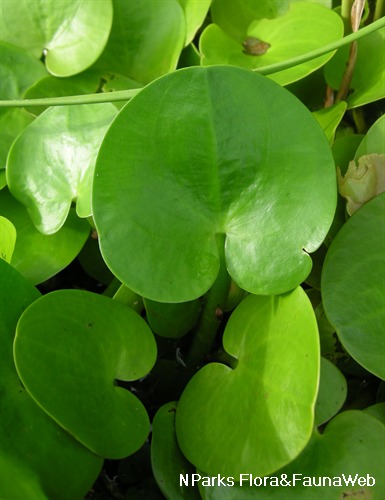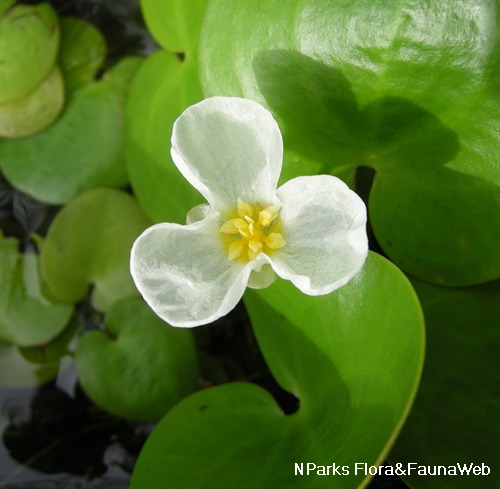
Back
Hydrocharis morsus-ranae L.
| Family Name: | Hydrocharitaceae |
| Synonyms: | Hydrocharis asarifolia Gray, Hydrocharis batrachyodegma St.-Lag |
| Common Name: | Common Frogbit, European Frogbit |
Name
Classifications and Characteristics
| Plant Division | Angiosperms (Flowering Seed Plants) |
|---|---|
| Plant Growth Form | Aquatic & Hydrophyte (Floating Aquatic) |
| Mode of Nutrition | Autotrophic |
Biogeography
| Native Distribution | Europe and Asia |
|---|---|
| Native Habitat | Aquatic (Freshwater Pond / Lake / River) |
| Local Conservation Status | Non-native |
Description and Ethnobotany
| Growth Form | A dioecious, evergreen, free-floating plant that can grow up to 10cm in height. |
|---|---|
| Roots | Long and numerous. |
| Foliage | The leaves are heart-shaped with a rounded apex. Leaf is glossy and smooth to touch with an entire margin, green and veined on the upper surface while spongy on the lower surface. The spongy lower surface is what helps the plant to float on water. The leaves are said to resemble the leaves of a miniature water lily. Leaves usually grow on the water surface but will rise above the water surface when the water is congested with the plant. |
| Flowers | Unisexual and have three white petals with a yellow centre. |
| Habitat | Is found growing in marshes, swamps and ditches wth poor drainage. It prefers calcium-rich water. |
| Cultivation | The plant is best grown under full sun in still or slow-moving water. |
Landscaping Features
| Desirable Plant Features | Ornamental Foliage |
|---|---|
| Landscape Uses | Pond / Lake / River |
| Thematic Landscaping | Water Garden |
| Usage Hazard - Cons | Invasive / Potentially Invasive |
| Usage Hazard - Cons Remarks | Large populations can form thick dense mats covering the water surface, restricting light, exchange of gases and nutrients. |
Plant Care and Propagation
| Light Preference | Full Sun |
|---|---|
| Water Preference | Lots of Water |
| Rootzone Tolerance | Waterlogged Soils (Does not Drain Site), Alkaline high pH Soils, Easy to Grow |
| Maintenance Requirements | Low |
| Fertilizing | Does not need fertilizing. |
| Propagation Method | Seed, Stolon / Runner |
| Propagation Ease | Easy |
| Propagation Method Remarks | The plant is propagated mainly by the daughter plants formed at the ends of the stolons. Seeds are rarely produced by the plant. |
Foliar
| Foliage Retention | Evergreen |
|---|---|
| Mature Foliage Colour(s) | Green |
| Mature Foliage Texture(s) | Smooth, Glossy / Shiny |
| Foliar Type | Simple / Unifoliate |
| Foliar Attachment to Stem | Petiolate |
| Foliar Shape(s) | Non-Palm Foliage |
| Foliar Margin | Entire |
| Foliar Apex - Tip | Rounded |
Non - Foliar and Storage
| Stem Type & Modification | Runner / Stolon |
|---|
Floral (Angiosperm)
| Flower & Plant Sexuality | Unisexual Flowers |
| Flower Colour(s) | White, Yellow / Golden |
|---|---|
| Flower Texture(s) | Thin |
| Flower Grouping | Solitary |
| Flower Location | Axillary |
Image Repository
Others
| Master ID | 31293 |
|---|---|
| Species ID | 5690 |
| Flora Disclaimer | The information in this website has been compiled from reliable sources, such as reference works on medicinal plants. It is not a substitute for medical advice or treatment and NParks does not purport to provide any medical advice. Readers should always consult his/her physician before using or consuming a plant for medicinal purposes. |


